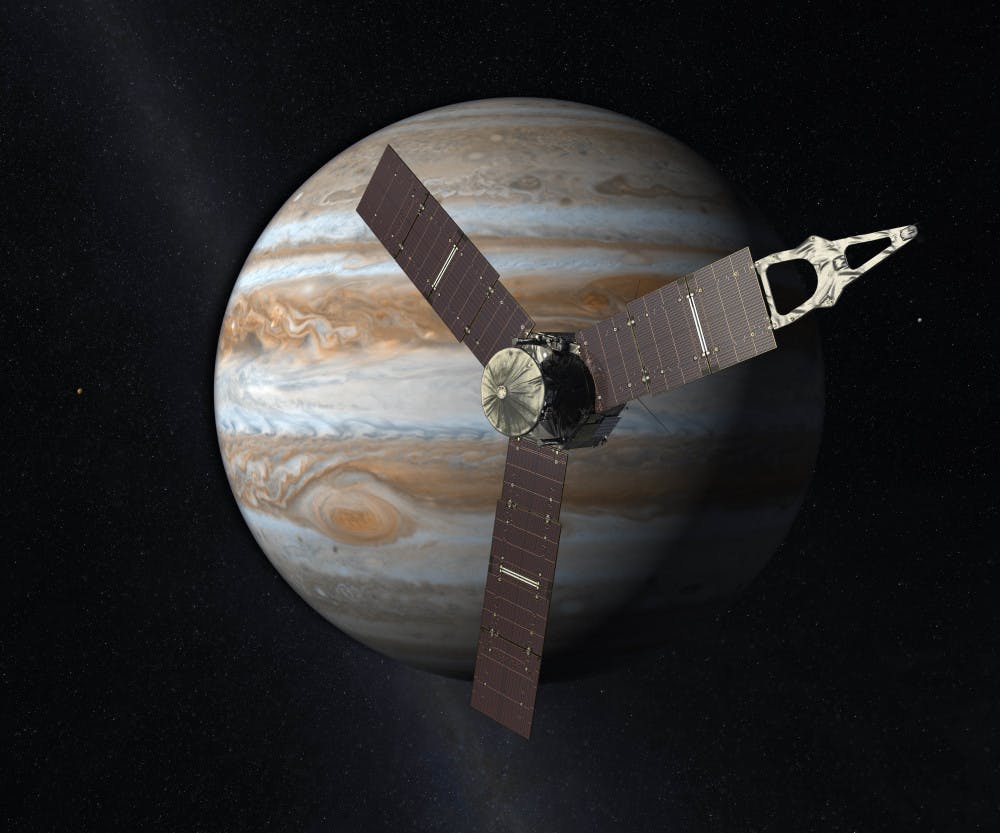So much news has happened. We can’t get to everything, but we’ll touch on a lesser-known thing and then a something-that-should-be-discussed-more thing.
Technology: It’s beautiful, even if new breakthroughs in our digital age often seem pointless or counterintuitive — like Android’s big announcement for its soon-to-be-released 7.0 software update “Android Nougat.” It’ll supposedly feature a smoother interface and a cool new feature of opening two apps at once. We’re for sexy new features and all, but let’s get real: It’s time we start getting phones that can last more than 30 minutes without dying. Give us better battery life or give us death (#backtothebasics).
Anyway, as we were saying, despite these trivialities, technology can be awe-inspiring. We’re witnessing such a development with NASA’s Juno spacecraft. Launched from Cape Canaveral, Florida, in August 2011, Juno was set to land in Jupiter’s atmosphere July 4.
Now, we published this paper before Juno’s live feed of its entrance was broadcast, so we can’t write on the success or failure of the landing. However, if successful, Juno’s set to spend an entire year orbiting Jupiter, collecting invaluable data about its atmosphere, the Big Red Spot... All the secrets you can know about a planet.
And even if this $1 billion mission narrowly misses Jupiter and trails off into the great abyssal unknown — better-known as New Jersey — scientists have already unearthed a mini success. Juno audio-recorded its plunge into Jupiter’s gargantuan magnetic field, and the recording is now free on the internet. It goes well with herbal tea and Pink Floyd — or some Radiohead.
Now, for those of you who wonder, “Why are we spending so much money sending stuff into space when we have all these problems down here?” understand all these things are connected. This concern is completely within reason — no one likes wasting time or money.
But recognize great developments in medical science have their basis in space exploration. The MRI example is famous, but as for a more recent example, in 2012 scientists officially coined a treatment for post-childbirth complications that often affect mothers in third-world conditions. Inspired by the anti-gravity suits astronauts use to re-enter orbit, medical practitioners can use pressure suits to alleviate, and even cure, the bleeding from these potentially fatal defects. Cool, huh?
So, now onto the topic that ought be discussed more: Iraq. Early Sunday morning, a suicide truck bomb ripped through a busy market area in Baghdad, resulting in what CNN World News reported as, “the deadliest single attack in Iraq’s war-weary capital in years.”
The blast killed more than 200 and wounded around 175, and some families are still searching for their relatives in the rubble. This attack came in the same week as the Ataturk Airport attack in Turkey and an attack in Bangladesh’s capital city, Dhaka, in which gunmen killed 20 hostages and two police officers.
Many on social media are criticizing the West for not responding to these attacks as it did with the attacks in Paris and Brussels. We at the Alligator agree, though we’re not surprised. On the one hand, the West generally presumes that conflict is inherent to that region of the world. Furthermore, the major media outlets are primarily ratings-driven. As a result, these tragedies get mentioned briefly but are then drowned out by the latest election coverage or celebrity gossip.
With this in mind, it is incumbent upon we the people to sympathize with the victims and raise our voices on our own terms. And rest assured, we at the Alligator will be right there with you.
This artist's rendering provided by NASA and JPL-Caltech shows the Juno spacecraft above the planet Jupiter. Five years after its launch from Earth, Juno is scheduled to go into orbit around the gas giant on Monday, July 4, 2016. (NASA/JPL-Caltech via AP)






